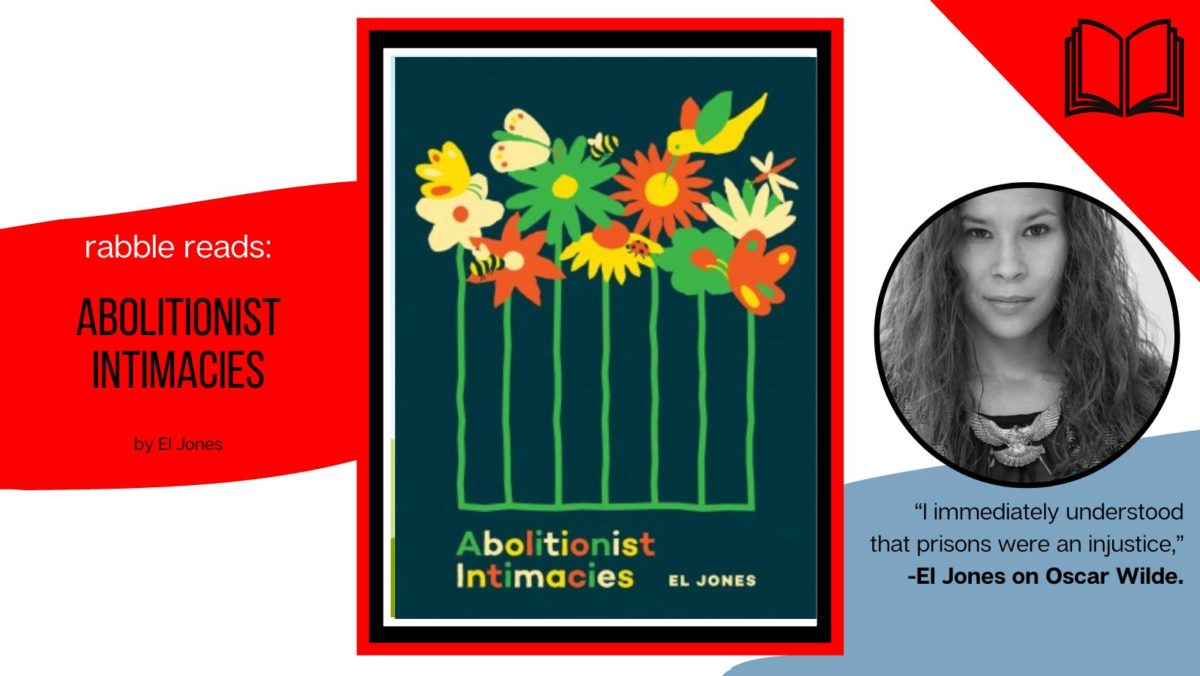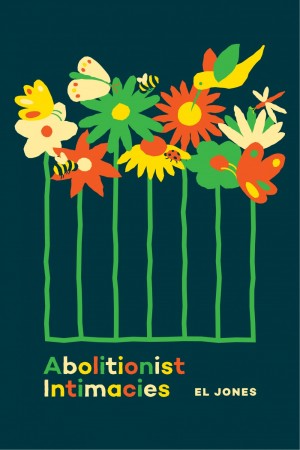El Jones never stops when it comes to fighting for those without a voice.
In her new book, Abolitionist Intimacies, the professor, author, poet, and social justice leader takes readers behind the bars and into the minds of those who are suffering from human rights violations inside Canadian prisons.
A conduit to the public for individuals being silenced, Jones relies on her decade of experience working with incarcerated people and their loved ones to showcase the humanity of her subjects.
Abolitionist Intimacies is an act of resistance and mutual aid — a book about love and the complexity of relationships interrupted by the criminal justice system.
Jones writes of her expansive experience of “listening, visiting, offering legal support, witnessing, intervening, and loving.”
While the name Abolitionist Intimacies might sound academic, Jones says it all comes back to two things: freedom and love.
Ahead of her official book launch, Jones told rabble.ca the title stems from the basic idea “that the state abuses our intimacy,” pointing to strict requirements for visits and unauthorized strip searches as just two examples of abuses of carceral intimacy.
Jones first opened up to the idea of abolition as a young girl. At 13, Jones writes about discovering the writings of famous poet Oscar Wilde, who was sentenced to two years in prison in 1895 for homosexual relations.
“I immediately understood that prisons were an injustice,” she said. “It just really spoke to me.”
As Jones became a decolonial thinker and put together the pieces of colonization and race, the lessons she learned helped inform her storytelling when it comes to “documenting what’s taking place in prison… with some kind of care for people’s stories.”
“A lot of the book is over the phone,” Jones explained. “Most of these people, you’re not seeing face-to-face. You may never meet. Obviously, we do see each other in freedom eventually, but a lot of the relationship is over a prison phone.”
Ultimately, Abolitionist Intimacies reflects those personal conversations that are so rare between the “inside” and the “outside.”
“As humans, we normalize a lot of things,” Jones said. “We learn to normalize injustice, we learn to normalize torture and pain and suffering.”
Jones noted that it’s easy for those outside of the criminal justice system to become normalized to terrible and unjust things that they’re mostly powerless against. But, she added, that feeling of powerlessness doesn’t mean you can’t listen.
The violence of paperwork
The book doesn’t stop at sharing the lived experiences of incarcerated people. Jones also exposes injustice in the criminal justice system, in the form of violence through bureaucracy, through paperwork.
One of the many powerful stories Jones covers in her book is one she had a front row seat in — the deportation case of child refugee Abdul Abdi.
In 2000, Abdi came to Canada with his sister Fatouma as young orphans and were quickly introduced to the child welfare system. As Jones explains in her book, the province of Nova Scotia never sought citizenship for the Abdi’s, and after moving to 31 different foster homes between the age of 6 and 19 — where they were subjected to horrific abuse — the federal government began the process of deporting Abdul.
Jones believes lawyer Benjamin Perryman said it best: “They were denied the right to even have rights.”
While governments act like they “know it best,” Jones says, what they really know best is how to “take kids into care.”
It’s not in the name of the child’s best interest either. The same state that takes a child away from undocumented parents, she says, will go on to defend border agents in court when it comes time to deport the child as an adult.
The irrationality of the prison space
For Jones, Abolitionist Intimacies gives readers a chance to enter “the irrationality of the prison space” that is often “hard to wrap your mind around in the free world.”
“You enter this space where you can’t reason your way out of it,” Jones said.
That irrationality also complicates any chance for incarcerated individuals to advocate for themselves and others. Carceral facilities are designed to deter and intimidate inmates from fighting for their rights. That’s why extreme protests like hunger strikes are so common.
“What it really shows you, beyond the technicalities and specific examples, is exactly this idea that the so-called instruments of justice operate so far outside of the law, and they’re able to do so because of these narratives around criminals,” Jones said.
She also pointed out that the Canada Border Services Agency (CBSA) currently has no oversight, meaning there’s no one to complain to when human rights are being violated. It also means there’s no accountability system for CBSA employees.
Looking back on her more-than-a-decade of work in legal advocacy, Jones has learned just how siloed the law can be — criminal lawyers don’t understand immigration law, and immigration lawyers don’t understand prison law.
She’s often asked by those in the legal system how she knows the intersections of criminal, immigration, and prison law so well. The answer is simple.
“People inside prison taught me a lot about how these systems work,” she’ll respond.
“It’s very mutual,” she said. “In the book, obviously I’m the one writing, but it’s not that I saved them — their love and care nurtures and sustains me.”
To Jones, it’s all about “the acts of care we do, from small to big, and it’s about how those things are our weapon against the state,” adding that labour and love are the two most important tools we have to harness change.
She describes Abolitionist Intimacies as a critical book that often calls into question the ethics and humanity of the criminal justice system. Despite its hard-hitted nature, she added, it’s also a gentle book that promotes compassion, one that serves as an account of Jones’ crucial frontline work.
“It’s really like my life’s work in that sense.”
Abolitionist Intimacies is available now online through Fernwood Publishing or at a local bookstore near you.




